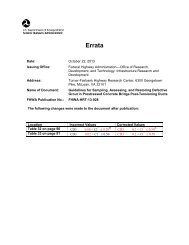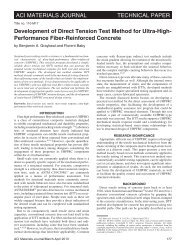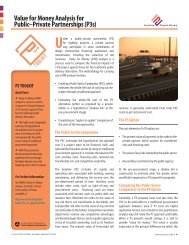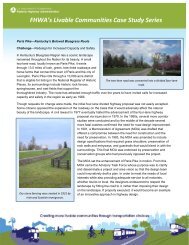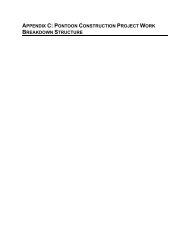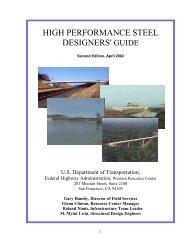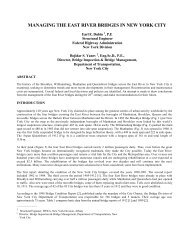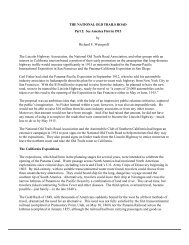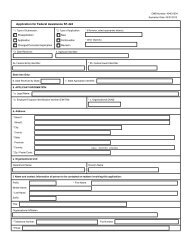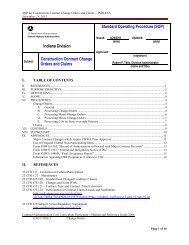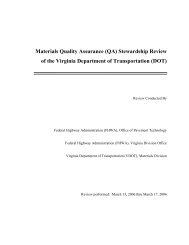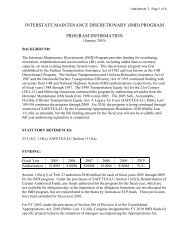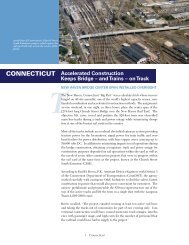Construction Program Management and Inspection Guide
Construction Program Management and Inspection Guide
Construction Program Management and Inspection Guide
You also want an ePaper? Increase the reach of your titles
YUMPU automatically turns print PDFs into web optimized ePapers that Google loves.
Appendix B: Quality Assurance Resources<br />
CONSTRUCTION PROGRAM MANAGEMENT AND INSPECTION GUIDE (5/01/04)<br />
B–8 SAMPLE<br />
When will these activities be performed? The earlier<br />
QC activities are performed, the more latitude the contractor<br />
has in dealing with problems. However, when activities are<br />
performed too early, there is a risk of unforeseen changes or<br />
glitches prior to actual construction. When will test results<br />
be available? This is a key component of the QC plan that<br />
determines largely how responsive it can be to deficiencies.<br />
How will inspections be performed? Using a st<strong>and</strong>ard<br />
checklist? Using the specifications themselves (quality<br />
assurance criteria), etc.? The more generalized <strong>and</strong> vague the<br />
inspection procedures are, the more likely they will not be<br />
consistently effective. However, not having a checklist is not<br />
a cause for disapproving a QC plan unless a checklist is<br />
specifically required.<br />
The CQCP should minimize any parroting or<br />
paraphrasing of requirements in the contract, <strong>and</strong> should<br />
avoid simply promising to comply with the contract. These<br />
kinds of statements <strong>and</strong> assurances are of essentially no added<br />
value. The CQCP must go beyond the contract<br />
requirements <strong>and</strong> address the contractor’s organizational<br />
process for consistently delivering those requirements.<br />
Subcontractors <strong>and</strong> Suppliers<br />
When subcontractors <strong>and</strong> suppliers (other than suppliers of<br />
commercial items) provide part of the work, then the QCP<br />
needs to be clear whether their QC responsibilities will be<br />
independent or a part of the prime contractor’s<br />
responsibilities. If they are independent, then the<br />
subcontractors or suppliers QCP must be developed <strong>and</strong><br />
submitted for approval, through the prime. Otherwise, the<br />
prime must address how it will monitor <strong>and</strong> verify<br />
subcontractor/supplier quality as a part of its plan. In either<br />
case the prime is contractually responsible for all the work,<br />
but being contractually responsible is not the same as having<br />
an active role in the quality delivery process.<br />
Manufactured Materials<br />
An important part of the CQCP is the process for verifying<br />
that manufactured materials comply with the requirements<br />
of the contract.<br />
Commercial Items. These are materials manufactured<br />
<strong>and</strong> sold to the general public, as opposed to materials made<br />
to the unique specifications of the agency. For most<br />
commercial items, the contractor’s responsibilities are<br />
limited to verification that the materials are as required or<br />
permitted in the contract, <strong>and</strong> that the delivered materials are<br />
in fact those approved materials. Some materials which are<br />
arguably commercial are considered of critical importance<br />
<strong>and</strong> have specific QC/QA requirements in the contract.<br />
Noncommercial Items. These are materials manufactured<br />
offsite, but specifically to agency specifications for this<br />
project. QC plan coverage for noncommercial items should<br />
be a separate document from the manufacturer, or the<br />
manufacture of those items should be included in the QC<br />
plan of the contractor or a subcontractor. Like critical<br />
commercial items, critical noncommercial items may have<br />
specific QC/QA requirements in the contract.<br />
Records <strong>and</strong> Documentation.<br />
While good documentation is often a reflection of good<br />
quality control, documentation is not the same thing as<br />
quality control. Documentation should be the minimum<br />
necessary to concisely document the adequate function of the<br />
process.<br />
Personnel Qualifications<br />
While some contracts may have specific required<br />
qualifications for contractor quality control <strong>and</strong> testing<br />
personnel, the initial judgment as to whether a given person<br />
is or is not qualified is generally left to the contractor.<br />
However, during contract administration, the agency may be<br />
more assertive in monitoring the qualifications of these<br />
personnel. When the contract has specific experience<br />
requirements, the contractor should describe how the<br />
person’s previous training <strong>and</strong> experience addresses these<br />
requirements.<br />
Partial Plans<br />
It is possible that subcontractors, suppliers, <strong>and</strong> overall<br />
responsibilities for some latter phases of the construction will<br />
have not been arranged at the time the prime is ready to<br />
begin on the initial phases. It is permissible for the contractor<br />
to submit, <strong>and</strong> the agency to accept, a partial plan. However,<br />
the work not covered by the plan may not begin until the<br />
plan is supplemented to cover that work.



